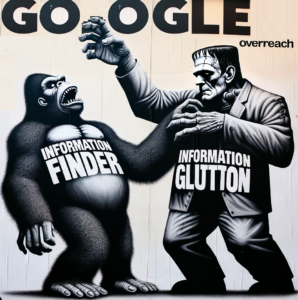Below is a long Twitter/X post about Google repackaging blogger Nate Hake’s content and thereby making it unnecessary to visit his blog, thus undercutting his business. The person who writes the commentary below, Sean Kaye, makes a good start. But he doesn’t go far enough. His perception about when things reached a tipping point also feels off. He writes: “It feels like a line has been crossed by Google over the last year or so.” I’ve been involved in search/SEO-based businesses since 2010, and I would say Google crossed that line at least around 2016, if not earlier.
Google advertises itself as in the business of search. But it is not, except as by-product of its main business. To make its search work, Google has to ingest the entire web, or at least as much of it as it can access. Any information it can access, it can consume. Google is an information feeder. Its incentive is not to help users find the creators of content but to be a one-stop shopping center for all information.
As Google characterizes its mission, it is to “organize the world’s information and make it universally accessible and useful.” And how better to make it universally accessible and useful except to repackage it and present it as self-contained items of information that can ignore the creator of the information. It’s a zero-sum game: to the degree that Google is sending consumers to a creator’s website, it is missing out on what consumers can spend with them. Moreover, with the recent rise of LLMs and AI, can rationalize that it is adding value by running through content of others and enabling a chatbot like Bard or ChatGPT to rewrite and upgrade the content. “We’ll take what you did and make it better.” What’s not to like except by those who created the content in the first place.
Short of an antitrust action by the government to prevent such usurpation of Internet content, Google, like an insatiable beast, will swallow as much content as it can from websites, and then repackage it in ways that will incentivize people to look no further than what they get right off the bat. Of course, they’ll be ripping off the content (consistent with Jaron Lanier’s long-standing criticism). But even if an antitrust action finally brings Google to heel, that’s likely to be well after content sites depending on search have been decimated. I hope I’m wrong because I have a dog in this fight.
In my view, the worries I’ve expressed here and that are expressed in the Twitter post below will play themselves out fully in 2024-25. It may be that a new president who cannot be bought will hold Big Tech to equity in the true sense of this much abused word (RFK Jr?). In the meantime, Google may try to backpedal and give creators of content more credit for their work without siphoning off as much of its value as they do now. But if they do so, it will be a temporizing measure to keep criticism against them from getting out of hand. If we think of Google not as a search engine but as an information feeder, its incentives will be to exploit information to the fullest and treat all information as its own. Search is merely a means to that end.
=====TWITTER POST=====
[SOURCE: https://twitter.com/seandoeslife/status/1737958808272703859?s=46]
This is an exceptional thread and conversation that @natejhake started.
In essence, Google took his images (some including him!) and his content, created snippets out of it in SERPs and basically generated a scenario where a search user doesn’t even have to go to his site to get an answer USING HIS CONTENT.
Clearly, that’s a “win” for the search user and a win for Google (they still surface ads on the SERPs page), but for Nate, that’s devastating.
Google’s claims that their focus on providing better results and experiences for search users is probably true and fair.
But there is a hierarchy.
If the search user is at the apex of the hierarchy, then the content creator that services the users information needs comes next.
But unfortunately, like all companies that get stupidly large, Google has started to routinely forget its place in the hierarchy.
It is third.
Search User
Knowledge/Info Creator
Google
But that’s not how Google now sees itself because it believes it can create knowledge and information too.
So now, in Google’s model it’s:
Search User
Google
Info Creator
That’s broken. Quite badly.
It leads to intellectual property theft and bordering on plagiarism.
It’s been coming for awhile, but it seems like AI has accelerated it considerably.
At some point, this is going to backfire.
I’m not sure how or when, but it is inevitable.
At some point, Google is going to need an awakening about what it is doing with search and pivot back to being a service provider that connects people with information creators’ websites.
Google was never intended to be the place where you GET the information and especially not get the information essentially scraped and reposted almost verbatim from other people.
It feels like a line has been crossed by Google over the last year or so.
A line where the argument of “good faith” breaks down.
It not longer feels like they are indexing, scraping, and cataloguing the internet to help people find things but instead it feels like they are doing those things to prevent people from leaving Google while still making ad revenue while not referring traffic.
The middleman has misunderstood its place.
It now sees itself as the creator and the people who create the information as merely the “middleman” to be exorcised from the user experience.
That’s a perversion of the purpose of Google in my eyes.
